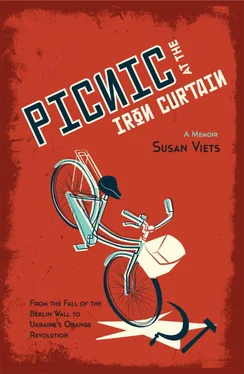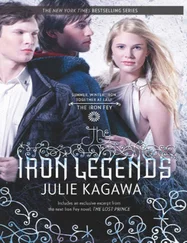One morning in early June, Louise telephoned. “Guess what?” she said.
I could not guess her news.
“The Serb family at Goran’s place is going home.” Once this family left, Goran could reclaim his summer house. “Why don’t you and Sydney come up for the weekend to help us celebrate?” I accepted the invitation.
Sydney drove. We left the outskirts of Sarajevo, passed a major SFOR base and soon turned onto narrow country roads. As we rounded the bend in one windy lane, we nearly ran into a large moving truck travelling in the opposite direction. Sydney reversed a long distance until he found a gap where he could pull over to let the truck pass. I felt relieved that he was driving, not me.
“Hi,” Louise said with a smile when we finally pulled up to the front door of the country house. “Goran’s in a bad mood. The movers dropped the fridge on his hand.” A few minutes later, we heard footsteps on the stairs. Goran came into the kitchen, nursing his bandaged hand. He was shirtless because of the heat.
“ Zdravo [hello],” he said to Sydney, waved at me, then turned toward Louise. As he moved, I saw his back, which shocked me far more than his injured hand. His back was covered in a tangle of thick, welted scars. Goran and Louise discussed the dinner menu, then Goran left. I said nothing but Louise must have sensed my shock and understood the cause.
“The war,” she said.
“What happened?”
“He belonged to the White Swallows.” I told Louise that I had not heard of them.
“They were an elite group of fighters. They tried to hold Mount Igman, key territory,” she said.
“His unit was decimated. He was injured, still conscious, but he couldn’t move. He watched his friends die. Then he just lay there and thought he’d die too.” I pictured the scene as she described how rescuers had found Goran and carried him down the mountain, blood dripping from his body, all gashes and pulp.
“You’ll never believe who operated on him and saved his life.”
“Who?” I asked.
“His brother. He was the surgeon on duty that night.”
Our topic of conversation changed as quickly as it had started. My mind raced to catch up, still dwelling on the battle scene, the aftermath. I wondered how Goran coped with all this. I could only relate through stories from World War II, but that was the past, the stuff of history books, not the present. Current events had so affected the lives of friends here.
The door opened again. A tall man holding an axe hobbled into the kitchen.
Louise introduced Sydney and me to Goran’s friend Zoran. He had just chopped firewood and wondered if Louise and Goran wanted some.
“How perfect!” Louise said to him. “We’ll use it for our barbecue tonight. Come join us.” Zoran thanked Louise but said that he already had plans. He limped away. We heard the thud of wood as it landed on the verandah and the patter of rain on the rooftop.
“What happened to Zoran’s foot?” I asked Louise.
“Half of it was blown off by a mine.”
“That’s terrible.” Louise had warned of mine-infested land by Goran’s country house. “Did it happen here?” I asked.
“Oh, no, when he was with his unit just toward the end of the war and he was really lucky.”
“Lucky?”
“His unit walked through a field. No one knew it was mined. When they marched back, Zoran stepped on a mine at the edge of the field. He fell forward into a clear area. If he had fallen back, his injuries would have been much worse.”
As we washed mushrooms and peppers, Louise told Sydney and me more about Zoran. He could not find a comfortable prosthesis. With no clinic in Sarajevo, Zoran had to order models from Germany and various other countries, but none fit properly.
“What a bad time, such pain,” Louise said. “Everything chafed.” Then Zoran found an American doctor online. They corresponded. The doctor sent him another model, which still didn’t quite fit right. But Zoran was skilled with his hands and modified this prosthesis, in consultation with the doctor, for a snug fit and minimal discomfort.
Through the window we saw the rain stop, the sky dramatic now, half dark with thunderclouds, half brilliant blue.
“Let’s pick some plums while we have the chance,” Louise said. Sydney, meat cleaver in hand, stayed behind in the kitchen. Louise and I stepped out the front door and walked down to the orchard, hung heavy with purple fruit. Louise turned up the bottom of her T-shirt, held it in one hand, stretched high and picked fruit with the other, the plums nestled in a pile in her makeshift basket. I copied her.
As we moved down the orchard rows, a reminder from Louise: “It’s fine to walk here, but some of the fields are mined.”
In the house, we transferred our harvest to a basket. Sydney’s pile of meat grew taller, a wooden bowl brimmed with salad, bright peppers lined a tray, ready for the barbecue. As the sun fell lower in the sky, mist rose up. We heard the dog bark and saw him amble up the road with Goran, who clutched a bottle. When he entered the kitchen, he held the bottle high, like a trophy.
“ Šljivovica ,” he said. “The neighbours make it. They have the best plums.” He’d already sampled the brew.
“We can watch the sun set from the balcony,” Louise said. “The view over the hills is beautiful. Let’s go up.” Goran led us through empty rooms. Furniture lay in a jumbled pile in one room, untouched since the movers had arrived that morning. A boom box stood by the balcony. Louise put on a CD. I recognized it as ambient electronica but did not know the group.
“Fabulous,” Sydney said. “I have this one.”
Goran found chairs. We sampled the šlivovica , then toasted the summer house, Goran and Louise, and the fragile peace. I stood up for a better view. Louise and Sydney joined me. I commented on the bucolic scene stretched out below, green rolling hills dotted with small houses, earth churned up in one field on a hillside.
“That’s great, I guess they’re farming again,” I said.
“What do you mean?” Louise asked.
“There, on the hillside, that dug-up earth. Farmers must be planting crops.”
“Oh, that’s not a field,” Louise said. “It’s a mass grave, an exhumation.” I listened, horrified, as she told me — her tone, matter-of-fact — that Serbs had marched Bosniacs who lived in the area over the ridge, shot some — possibly one hundred — and dumped their bodies in that grave. I wondered what wartime nightmares Louise and Goran had experienced that rendered a mass grave commonplace and accepted as an unremarkable part of the landscape.
I wanted to move away. It felt indecent to gaze at a grave like that. We went downstairs, the air on the ground-floor verandah redolent with the smoky smell of meat that roasted. Goran stood over the barbecue; flames leaped up through the grill, bright orange in the dark. He tended kebabs and peppers, turned them regularly, fat sizzled as it hit the fire. Sydney poured more slivovic, then wine. We toasted Goran’s neighbours, his newly reclaimed house. His dog joined us. He soon lay tucked under the table, ready for scraps to fall. Music wafted down from the balcony. Platters that spilled over with meat and vegetables filled the table. Slowly the fire died down.
Sydney left the table, slid away in the dark. A few minutes later, he returned to his seat and calmly said, “I’ve chopped my thumb off.” Louise and I both thought that Sydney meant that he had cut his thumb. Louise handed him a roll of army gauze, which she still had in her pocket from Goran’s accident earlier in the day. I could not see Sydney for lack of light but wondered at his tone of voice. I walked over to his chair.
Читать дальше












